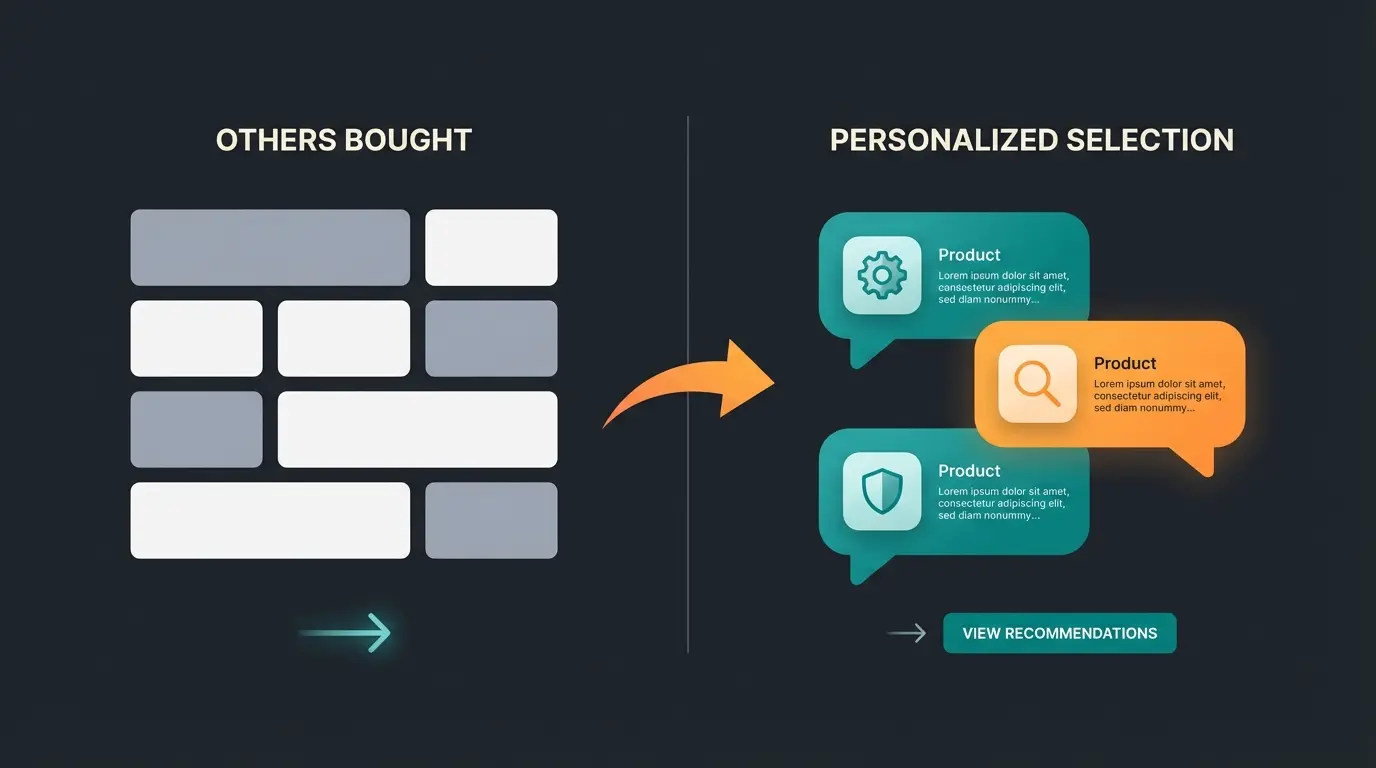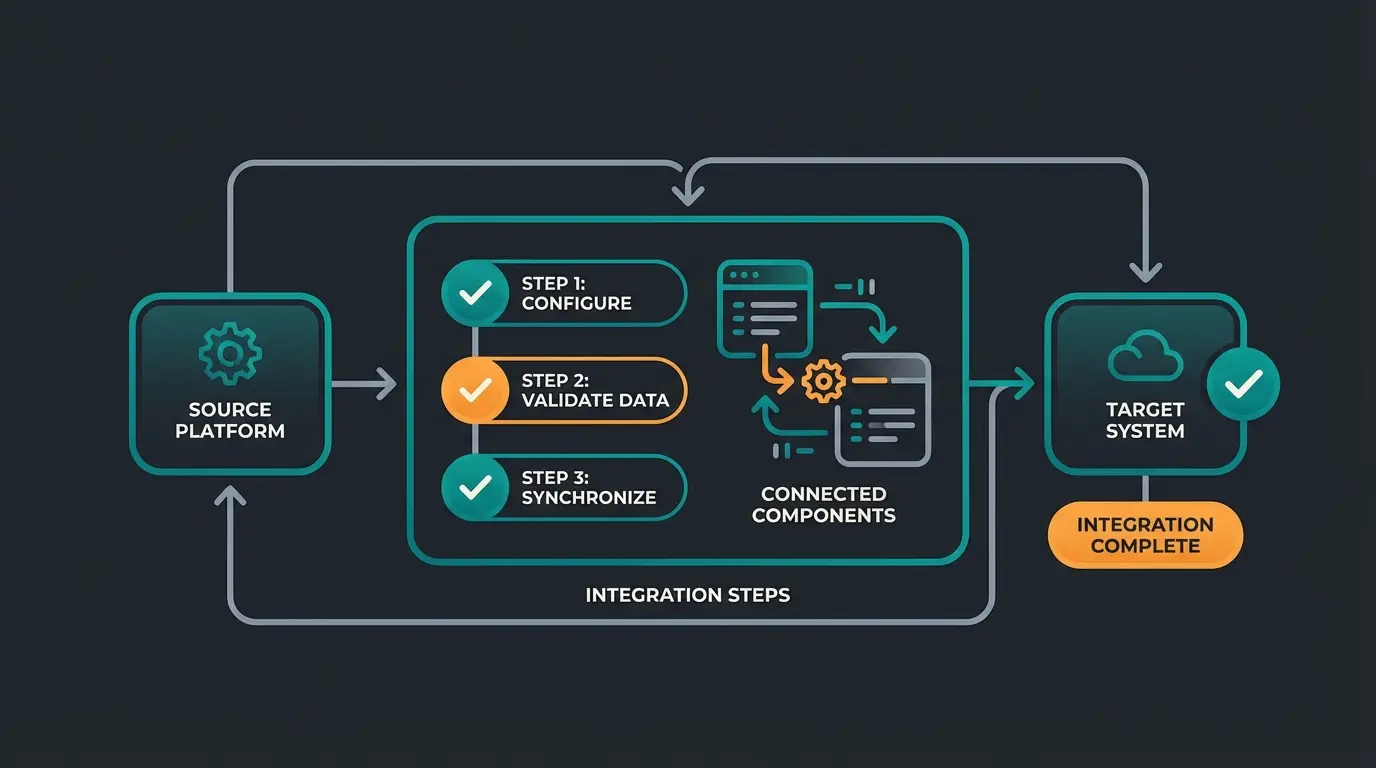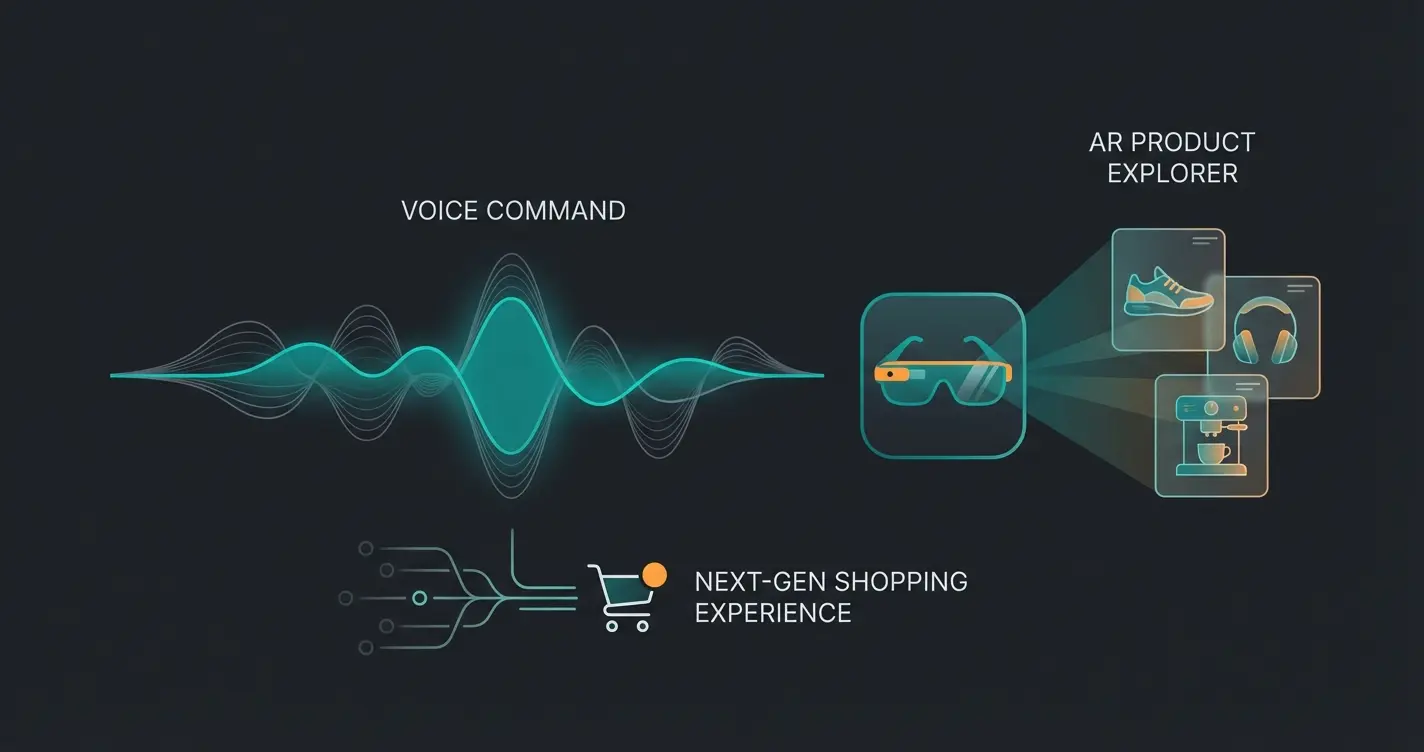Introduction to Product Recommendations in E-Commerce
Product recommendations have become an indispensable tool in e-commerce for personalizing the shopping experience and increasing revenue. They are digital suggestions presented to customers based on their browsing behavior, previous purchases, or similar customer profiles. In the rapidly evolving world of online retail, these recommendations play a central role in optimizing customer experience and boosting conversion rates.
The significance of product recommendations for online stores and digital marketing can hardly be overstated. According to current e-commerce statistics from HubSpot, personalized recommendations can increase conversion rates by up to 150%. They enable retailers to offer customers relevant products they might otherwise have overlooked, thereby promoting cross-selling and up-selling opportunities.
However, there's a fundamental problem with how most online stores approach recommendations today. The majority rely on what we call "The Shelf Stocker" approach—static widgets that simply organize products based on aggregate data. What customers actually need is "The Expert Consultant"—an intelligent system that actively engages with their specific needs and guides them to the perfect solution.
The Problem: Why Standard Widgets No Longer Suffice
Today's online shoppers face what psychologists call the "Paralysis of Choice." With thousands of products available at their fingertips, customers often feel overwhelmed rather than empowered. Standard recommendation widgets—showing "Customers who bought this also bought..." or "Trending now"—add to this noise rather than cutting through it.
The fundamental issue is that traditional recommendation engines are guessing, not knowing. They rely on statistical correlations from past behavior, which tells you what similar people did, but not why they did it or whether it actually solved their problem. A static engine might suggest a winter coat in July because it's on sale—but a true consultant would first ask, "Where are you traveling?"
This article will dive deeper into the world of product recommendations, examining different types of recommendations, explaining the technology behind them, and showcasing the benefits for e-commerce businesses. More importantly, we'll explore how AI-powered product consultation represents the next evolution—transforming static widgets into dynamic, consultative experiences that truly understand and serve customer needs.

Types of Product Recommendations in Online Retail
There are various approaches to product recommendations in e-commerce, each with its own strengths and application areas. Let's examine the most important types in detail:
Personalized Recommendations Based on Customer Behavior
This type of recommendation uses a customer's individual browsing and purchasing behavior to make tailored suggestions. By analyzing product views, search history, and previous purchases, AI-powered product recommendations can precisely predict which items might interest the customer. This method is particularly effective for increasing customer loyalty and encouraging repeat purchases.
Cross-Selling and Up-Selling Strategies
Cross-selling aims to recommend complementary products, while up-selling suggests higher-value or more expensive alternatives. Both strategies can increase the average order value and improve the customer experience by drawing attention to additional needs or desires the customer may not have considered yet.
For example, when a customer purchases a camera, cross-selling would suggest compatible lenses, memory cards, or camera bags. Up-selling would highlight a more advanced camera model with better features. The key difference with AI consultation is explaining why these recommendations matter: "Based on your interest in night photography, this lens with f/1.4 aperture will give you significantly better low-light performance."
Popularity-Based Recommendations
This method presents products that are overall most popular with customers or best-selling in a specific category. It's particularly useful for new visitors about whom no personalized data exists yet, and can strengthen trust in product quality. However, it represents the most basic level of recommendation—essentially showing what's already successful rather than discovering hidden gems that match individual needs.
Category-Based Suggestions
Here, products from the same or related categories that the customer is currently viewing are recommended. This type of recommendation helps showcase product variety and encourages customers to explore deeper into the assortment.
Each of these methods has its advantages and disadvantages. Personalized recommendations can be highly effective but require extensive data and complex algorithms. Popularity-based recommendations are easier to implement but offer less personalization. The choice of the right method depends on factors such as the size of the product catalog, available customer data, and specific business goals.
To maximize the effectiveness of product recommendations, many successful e-commerce companies combine different approaches. This way, they can leverage the benefits of each method while compensating for their drawbacks. Continuous analysis and optimization of recommendation strategies is crucial for achieving long-term successful results and continuously improving the customer experience.
The Evolution: From Static to Consultative Recommendations
Understanding where product recommendations have come from helps illuminate where they need to go. The maturity of recommendation systems can be understood as a progression through distinct levels, each representing a leap in sophistication and customer value.
Staff picks and 'Our Favorites' selections based on merchandiser intuition
'Customers who bought X also bought Y' based on aggregate purchase data
Individual browsing history and purchase patterns drive recommendations
Interactive dialogue understanding intent, context, and specific needs
Level 1: Manual Curation—The Starting Point
The earliest form of product recommendations was simply manual curation—merchandisers selecting "Staff Picks" or "Our Favorites" based on intuition and inventory goals. While this approach has its place, it scales poorly and offers zero personalization.
Level 2: Statistical Correlation—The Current Status Quo
Most e-commerce sites today operate at Level 2, using collaborative filtering to show "Others who viewed this also viewed..." or "Frequently bought together." While this represents a significant improvement over manual curation, it has critical limitations:
- Cold and impersonal: Treats customers as data points rather than individuals
- Prone to errors: Correlations don't equal causation—just because items are bought together doesn't mean they solve the same problem
- No context awareness: Cannot account for why a customer needs the product
- Creates filter bubbles: Keeps showing similar items rather than expanding horizons
Level 3: AI Consultation—The Competitive Advantage
The next evolution isn't just better algorithms—it's a fundamental shift from passive suggestions to active consultation. Instead of silently analyzing clicks in the background, conversational AI engages directly with customers to understand their specific needs.
Consider the difference: A traditional recommendation engine sees you browsing cameras and shows "Popular cameras" or "Cameras others bought." An AI consultation system asks: "What type of photography are you most interested in? Do you prefer something lightweight for travel, or are you willing to carry more weight for better image quality?"
This shift from understanding User History to understanding User Intent is what separates the digital shelf stocker from the digital sales expert.
Technology Behind Modern Product Recommendations
The technology powering modern product recommendation systems is complex and diverse. At its core are advanced machine learning algorithms and data mining techniques that enable companies to extract valuable insights from large data sets and transform them into personalized recommendations.
Machine Learning Algorithms for Product Recommendations
Machine learning algorithms form the heart of effective product recommendation systems. These algorithms continuously learn from customer data, purchase histories, and browsing behavior to generate increasingly precise and relevant recommendations. Particularly advanced systems utilize vector databases for product recommendations, enabling fast and efficient processing of large data volumes.
Data Mining Techniques in Practice
Data mining plays a central role in creating product recommendations. These techniques help discover hidden patterns and connections in customer data. By analyzing purchase histories, product reviews, and search behavior, e-commerce companies can gain valuable insights into their customers' preferences and needs.
Collaborative Filtering: How It Works and Its Applications
Collaborative filtering is a widely used technique in recommendation systems. This method is based on the assumption that customers with similar preferences in the past will also like similar products in the future. There are two main approaches:
- User-based filtering: Compares a user's behavior with that of other, similar users
- Product-based filtering: Recommends products based on their similarity to other products the user has liked
Content-Based Filtering in E-Commerce
Content-based filtering focuses on the properties of the products themselves. This method analyzes product descriptions, categories, and other metadata to identify similarities between products. It's particularly useful when little user data is available or for new products in the assortment.

Data Privacy in AI System Implementation
When implementing AI-powered product recommendation systems, data privacy is of crucial importance. Companies must ensure they comply with GDPR and other relevant data protection regulations. This includes transparent communication about how customer data is collected and used, as well as implementing robust security measures to protect sensitive information.
One significant advantage of conversational AI is its ability to work with Zero-Party Data—information customers willingly share through direct interactions. Unlike third-party cookies that track behavior across websites (increasingly blocked by browsers), zero-party data comes from asking customers directly about their needs. This builds trust while providing more accurate insights.
Why Consultation Beats Prediction Every Time
The fundamental shift from recommendation engines to consultation systems isn't just technological—it's philosophical. It's the difference between treating customers as data points and treating them as individuals with unique problems to solve.
Context Matters More Than History
A statistical recommendation engine might suggest sunscreen to someone who bought it last summer. But a consultative system would first understand: Are you going to a tropical beach or skiing in the Alps? Do you have sensitive skin? Are you looking for reef-safe options? The same person might need completely different products depending on context that historical data simply cannot capture.
Explaining the 'Why' Builds Trust
Consider two approaches to recommending a laptop:
- Static engine: "Customers who viewed this laptop also viewed these models" (No explanation, relies on social proof)
- AI consultant: "Based on your need for video editing, I recommend this laptop because it has a dedicated GPU and 32GB RAM, which will handle 4K editing smoothly" (Clear reasoning, demonstrates understanding)
The second approach doesn't just suggest a product—it validates the recommendation by connecting features to the customer's specific use case. This transparency builds trust and reduces buyer's remorse.
| Feature | Standard Recommendation Engine | AI Consultation Solution |
|---|---|---|
| Data Source | Cookies, browsing history, aggregate patterns | Direct customer answers, stated preferences, intent signals |
| Interaction Style | Passive (runs in background) | Active (engages in dialogue) |
| Primary Goal | Generate clicks and page views | Solve customer problems, find best solution |
| Customer Feeling | Generic, sometimes creepy | Understood, valued, confident |
| Explanation | None or 'Others bought this' | Clear reasoning tied to stated needs |
| Cold Start Problem | Struggles with new users | Works immediately through conversation |
Stop guessing what customers want. Start understanding their needs with AI-powered consultation that increases conversions by up to 150%.
Start Free ConsultationBenefits of Intelligent Product Recommendations
Product recommendations offer e-commerce companies a variety of benefits that positively impact both business success and customer satisfaction. The integration of AI-powered product consultation can amplify these benefits and lead to measurable improvements in various areas.
Revenue and Profit Growth Through Targeted Recommendations
One of the most obvious benefits of product recommendations is the potential increase in revenue and profit. By presenting relevant products at the right time, companies can:
- Promote cross-selling: Customers become aware of complementary products that genuinely enhance their purchase
- Enable up-selling: Higher-value or higher-margin products are suggested with clear explanations of added value
- Stimulate impulse purchases: Spontaneous additional purchases are encouraged through contextually relevant suggestions
- Reduce returns: Better-matched products mean higher satisfaction and fewer returns
With personalized AI recommendations vs. no recommendations
When cross-selling is based on understood customer needs
Through better product-customer matching via consultation
When recommendations feel helpful rather than pushy
Improving Customer Experience and Satisfaction
Well-implemented product recommendations can significantly improve the entire shopping experience for customers. They help customers find what they're looking for faster and discover products they might otherwise have overlooked. This leads to higher customer satisfaction and a positive perception of the online store.
The shift from "recommendation" to "consultation" is crucial here. When a system doesn't just show products but explains why they're relevant—"This hiking boot is ideal for your planned Patagonia trip because of its waterproofing and ankle support"—customers feel understood rather than marketed to.
Strengthening Customer Loyalty and Repeat Purchases
Personalized product recommendations contribute to customers feeling understood and valued. This strengthens the emotional connection to the online store and increases the likelihood of repeat purchases. Customers who regularly receive relevant and interesting product suggestions are more likely to return for shopping.
Inventory Optimization Through Precise Sales Forecasts
An often-overlooked benefit of product recommendation systems is their ability to help optimize inventory management. By analyzing recommendation patterns and customer reactions, companies can create more accurate sales forecasts. This enables more efficient inventory management, reduces overstock, and minimizes the risk of sold-out items.
Best Practices for Effective Product Recommendations
Best Practices for Effective Product Recommendations
Successful product recommendations are based on proven strategies that improve customer experience while simultaneously boosting revenue. To fully exploit the potential of product recommendations, online retailers should observe the following best practices:
Optimal Timing and Placement: Present recommendations at strategically important points in the customer journey. This includes the product detail page, shopping cart, and checkout page. A well-placed recommendation can strengthen the purchase impulse and increase the likelihood of an additional purchase. However, don't just place widgets—make the AI visible with clear calls-to-action like "Need help choosing? Let our product advisor help."
Relevance and Accuracy: Ensure your recommendations are always relevant and precise. Use data on customer behavior, purchase history, and current trends. The more accurately recommendations are tailored to individual customer needs and preferences, the higher the probability of conversion. With consultative AI, relevance comes from understanding stated needs, not just inferred patterns.
Transparent Communication: Inform your customers why certain products are being recommended. For example: "We recommend this moisturizer because you mentioned dry winter skin" is far more compelling than "Others bought this." This transparency creates trust and increases acceptance of recommendations.
Mobile Optimization: With the increasing share of mobile commerce, it's essential that your product recommendations display optimally on all devices. Pay attention to responsive design that adapts to different screen sizes and provides a seamless user experience.
Seasonality and Trends: Consider seasonal factors and current trends in your recommendations. Adapt your suggestions to seasons, holidays, or special events to increase the relevance and attractiveness of your recommendations.
According to current e-commerce trends from Doofinder, personalized product recommendations can increase conversion rates by up to 150%. This figure underscores the importance of thoughtful implementation of product recommendations in online retail.
Implementing AI-Powered Product Recommendations
Successfully introducing a product recommendation system requires careful planning and execution. The following steps are crucial for effective implementation:
Selecting the Recommendation Engine: Choose a solution that fits your specific requirements. Consider factors such as the size of your product catalog, desired personalization depth, and system scalability. Modern AI systems for product recommendations enable highly personalized and effective suggestions that go beyond simple statistical correlations.
Integration into E-Commerce Platforms: Ensure the chosen system can be seamlessly integrated into your existing e-commerce platform. Smooth integration is crucial for the performance and reliability of recommendations.
A/B Testing for Optimization: Conduct regular A/B tests to compare different recommendation strategies and identify the most effective approaches. Test different placements, formulations, and presentation formats to achieve the best results. Compare conversational interfaces against traditional widgets to measure the uplift.
GDPR-Compliant Implementation: Pay attention to compliance with the General Data Protection Regulation (GDPR) during implementation. Ensure all collected and processed customer data complies with applicable data protection regulations. Conversational AI has an advantage here—it primarily uses zero-party data that customers willingly provide.
Team Training: Train your team in using the new product recommendation system. A well-informed team can use the system more effectively and make adjustments as needed.

Measuring Success of Product Recommendations
Implementing product recommendations is only the first step. To ensure long-term success, continuous performance measurement and optimization is essential. Here are the key aspects to consider when measuring the success of your product recommendations:
Relevant KPIs for Product Recommendations
To measure the effectiveness of your product recommendations, focus on the following key indicators:
- Click-through rate: The percentage of users who click on recommended products
- Conversion rate: The proportion of users who actually make a purchase after clicking on a recommendation
- Average order value: The change in average order value through product recommendations
- Revenue per visitor: Total revenue divided by number of visitors to measure recommendation efficiency
- Bounce rate: The percentage of users who leave the website without interacting with recommendations
- Recommendation acceptance rate: How often customers engage with and accept AI suggestions
Methods for Conversion Rate Optimization
Conversion rate is a central indicator of your product recommendations' success. The following methods can be applied for optimization:
- A/B testing: Compare different recommendation algorithms or display methods to determine the most effective variant
- Personalization: Use customer data to individually customize recommendations and make them more relevant
- Timing: Experiment with the timing of recommendations to find the optimal moment for conversions
- Visual optimization: Test different designs and layouts to maximize user attention
- Conversation flow testing: For consultative AI, test different question sequences and response styles
According to current research on personalization in e-commerce from Shopify, personalized product recommendations can increase conversion rates by up to 150%.
Analyzing Customer Feedback and Satisfaction Surveys
In addition to quantitative data, qualitative feedback is invaluable. Conduct regular customer surveys to determine satisfaction with product recommendations. Pay particular attention to the following aspects:
- Relevance: Do customers find the recommendations appropriate and helpful?
- User-friendliness: How easily can customers find and purchase recommended products?
- Trust: Do the recommendations strengthen trust in your online store?
- Customer satisfaction: Do recommendations lead to higher overall satisfaction with the shopping experience?
Long-Term Monitoring and Continuous Improvement
Optimizing product recommendations is an ongoing process. Implement a system for continuous monitoring and improvement:
- Regular review: Analyze KPIs at set intervals to identify trends and changes early
- Algorithm updates: Adjust your recommendation algorithms based on collected data and insights
- Competitive analysis: Observe your competitors' strategies and identify best practices in your industry
- Technology upgrades: Stay current with recommendation technologies and integrate promising innovations
Through consistent application of these methods for success measurement and optimization, you can ensure your product recommendations continuously contribute to increasing your e-commerce success.
Future Trends in AI Product Recommendations
The world of product recommendations is constantly evolving. To remain competitive, it's important to look at future trends and prepare for them. Here are some of the key developments that will shape the future of product recommendations:
AI and Advanced Machine Learning
Artificial intelligence and machine learning will revolutionize product recommendations:
- Real-time adaptation: AI systems will be able to adapt recommendations in real-time based on current browsing behavior
- Contextual recommendations: Advanced algorithms will incorporate user context (weather, location, time of day) into recommendations
- Predictive models: AI will predict not only current preferences but also future needs
- Conversational intelligence: Natural language processing will enable more human-like consultative interactions
The integration of AI-powered product recommendations will enable companies to make even more precise and relevant suggestions.
Voice-Controlled Recommendations and Virtual Assistants
With the increasing prevalence of voice assistants and smart speakers, voice-controlled product recommendations will gain importance:
- Conversational recommendations: Virtual assistants will understand user needs through conversations and recommend matching products
- Multimodal interactions: The combination of voice, text, and visual elements will lead to richer recommendation experiences
- Personalized voice profiles: Systems will recognize individual speech patterns and preferences and adjust recommendations accordingly
Integration of Augmented Reality
Augmented Reality (AR) will fundamentally change how product recommendations are presented and experienced:
- Virtual try-ons: Customers can virtually try on or place recommended products in their environment
- Interactive product visualizations: AR will enable viewing products in 3D and interacting with them before purchase
- Context-based AR recommendations: Matching products will be displayed in AR based on the user's real environment
Ethical Considerations and Data Privacy Aspects
As technology advances, ethical questions and privacy concerns will come to the forefront:
- Transparency: Companies must openly communicate how recommendations are generated and what data is used
- Data privacy: Implementing robust data protection measures will be crucial for maintaining customer trust
- Fairness: Algorithms must be designed not to disadvantage or discriminate against certain groups
- Control: Users should have the ability to determine the degree of personalization themselves and manage their data
The future of product recommendations promises to become even more accurate, context-aware, and interactive. Companies that recognize these trends early and integrate them into their strategies will have a decisive competitive advantage. At the same time, it will be more important than ever to establish ethical guidelines and data protection practices to gain and maintain customer trust.

Case Studies and Success Stories
Product recommendations have proven highly effective across various industries. Here are some examples of successful implementations:
E-Commerce Giant Optimizes Customer Experience
A leading online retailer implemented an AI-powered recommendation system that analyzes customer behavior, search history, and product affinities. The result: a 35% increase in conversion rate and a 28% rise in average order value. The AI-powered product consultation enabled precise personalization that benefited both customers and the company.
Fashion Industry Benefits from Tailored Suggestions
An online fashion retailer relied on vector databases for product recommendations to suggest matching outfits to customers. The technology considered factors such as body type, style preferences, and past purchases. The result was impressive: 40% higher customer satisfaction and a 25% reduction in return rates.
The Shift from Search to Ask
What these success stories have in common is a fundamental shift in approach. Instead of waiting for customers to search and filter through countless options, these companies proactively engage customers in dialogue. They ask questions, understand context, and guide decisions—just like the best in-store sales consultants do.
Frequently Asked Questions About Product Recommendations
Traditional product recommendations are passive—they display suggestions based on historical data like 'customers also bought' without understanding why. Product consultation is active—AI engages in dialogue with customers, asks about their specific needs, and explains why certain products are the best fit. Consultation solves problems; recommendations just show options.
AI consultation increases conversions by reducing decision paralysis, building trust through transparent explanations, and matching products to stated needs rather than assumed preferences. Studies show personalized AI recommendations can boost conversion rates by up to 150% compared to non-personalized experiences.
Yes, when implemented correctly. AI consultation actually has a privacy advantage—it primarily uses zero-party data that customers willingly share during conversations, rather than relying on third-party cookies that track behavior across websites. Always ensure transparent data usage policies and give customers control over their information.
Implementation time varies based on your e-commerce platform and requirements. Basic integration can be completed in 2-4 weeks, while full customization with training on your product catalog may take 6-8 weeks. The key is choosing a solution that integrates smoothly with your existing systems.
Most businesses see ROI within 3-6 months through increased conversion rates (15-35% uplift), higher average order values (20-30% increase), and reduced returns (15-25% decrease). The exact ROI depends on your product complexity, average order value, and current conversion baseline.
Conclusion and Future Outlook
Product recommendations have become an indispensable component of successful e-commerce strategies. They offer numerous benefits:
- Revenue growth: Through targeted suggestions, the likelihood of additional purchases increases significantly
- Customer satisfaction: Personalized recommendations—especially consultative ones—improve the shopping experience
- Efficiency: AI-powered systems optimize the sales process and relieve staff workload
- Competitive advantage: Innovative recommendation technologies distinguish online stores from the competition
However, the future belongs not to static widgets that merely organize digital shelves, but to intelligent consultation systems that act as digital sales experts. The shift from "showing what others bought" to "understanding what you need" represents the next frontier in e-commerce personalization.
For e-commerce businesses, it's crucial to keep pace with these trends and continuously invest in improving their recommendation systems. Only then can they succeed in an increasingly competitive market and offer their customers exceptional shopping experiences.
Product recommendations are more than just a marketing tool—they are the key to long-term success in e-commerce. Companies that skillfully deploy this technology will not only increase their revenues but also build lasting customer relationships and position themselves as innovative leaders in their industry.
Join forward-thinking e-commerce leaders who are already using AI consultation to understand customer needs, not just track their clicks. See how personalized guidance can boost your conversions.
Get Started Free
